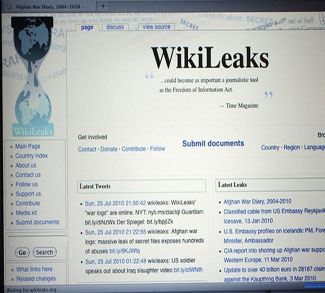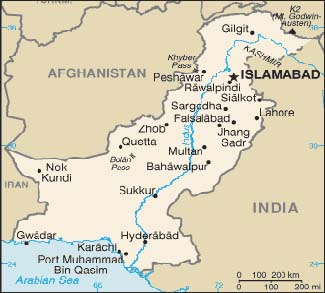FORECAST
The United States has begun signalling a new strategy in the seven-year long Afghanistan War: peace talks with the Taliban.
The about face in American strategy in Afghanistan comes amid a growing Taliban insurgency that has crippled Kabul’s influence in the Pashtun south, and extended into the Pashtun areas of northwest Pakistan. US Defense Secretary Robert Gates revealed the turn in American strategy a little less than a month ago when he declared that ultimately political reconciliation with the Taliban is not only necessary to ending the Afghan conflict but, in his words, “conceivable”.
Ever since Gates’ revelation, focus has centred on General Patreaus, who became the new Chief of CentCom (including responsibility for the Afghanistan theatre of war) October 31. Patreaus, who is credited for drastically reducing anti-American violence in Iraq by controversially making peace with anti-American Sunni insurgents, is widely expected to apply a similar strategy to Afghanistan: make peace with the insurgents, surge in American troops into key trouble spots, and pay huge ransoms to local tribal leaders to turn against foreign fighters.
In fact, Patraeus has already tacitly signaled just that, by declaring that he will look beyond military means to conduct American strategy in Afghanistan. In doing so, Patraeus echoed comments earlier attributed to the top British general in Afghanistan proclaiming that there is simply no military solution to the Afghanistan conflict, a sentiment already publicly condoned by the British Prime Minister.
American acceptance of a political reconciliation with the Taliban mirrors recently held peace talks between the pro-American Karzai government in Kabul and the Taliban held in Saudi Arabia, under the sponsorship of the Saudi Islamist monarchy.
The problem facing American foreign policy in Afghanistan vis-à-vis the Taliban is that for seven years Americans have fought a bloody war with a simple stated goal: the ultimate destruction of the Taliban. This ‘unconditional surrender’ doctrine will have to be abandoned if a peace deal with the Taliban is “conceivable”.
The next president of the United States will inherit the daunting task of convincing the American public that despite seven years of linking the Taliban with al-Qaeda, with (erroneously) 9/11, and the deaths of hundreds of American military personnel. Yet, such an abrupt sea change is not unprecedented in American geopolitical rhetoric. In Iraq, after years of claiming the Sunni insurgents were Baathist fanatical ‘dead-enders’ with American blood on their hands, those same “illegal” combatants are now American allies.
Nonetheless, convincing the American public that it is morally justified to sit across from the table with the Taliban and shake hands on a peace deal is another story. Perhaps not since the Nazis has any specific group been so demonized by the United States than the Taliban. No doubt the first step in any such process of un-demonizing the Taliban will be to retract the lie proliferated by both American political parties of the alleged Taliban responsibility for 9/11. Americans will simply have to be told the truth that the Taliban are a local Afghani group that allied itself with al-Qaeda for operational purposes in defending against the American led fall 2001 invasion, but does not necessarily share al-Qaeda’s internationalist agenda.
Interestingly, the Taliban have indicated their willingness to severe ties with al-Qaeda as part of a peace deal, an absolute must if American support for a peace deal is to be realized.
There is little doubt now that peace talks with the Taliban will soon commence.
The Taliban is a powerful local militia – the armed wing of the most populous ethnic group in Afghanistan, the Pashtuns. Peace and security in Afghanistan is impossible without their cooperation. The Taliban cannot be defeated militarily, as even American generals have now admitted. After seven long years, longer than it took to defeat the Germans and Japanese in World War II combined, the Taliban are stronger than ever, and their power and influence continues to grow.
SUMMARY OF EVENTS: October 27 – November 3, 2008
NORTH AMERICA
United States
U.S. military helicopters launched an extremely rare attack Sunday on Syrian territory close to the border with Iraq, killing eight people in a strike the government in Damascus condemned as “serious aggression.”
An expected cut in US interest rates and moves to ease the impact of the financial crisis sparked a rare surge on global markets Tuesday, despite new warnings that the worst was yet to come.
The American International Group is rapidly running through $123 billion in emergency lending provided by the Federal Reserve, raising questions about how a company claiming to be solvent in September could have developed such a big hole by October. Some analysts say at least part of the shortfall must have been there all along, hidden by irregular accounting.
In the final days of the US presidential election, campaign yard signs are being defaced, fliers advise Democrats to vote a day late, DVDs warning of Islam’s clash with the West flood mailboxes, and allegations of fraud are flying.
The White House on Friday defended its bid to push through a series of new rules that could relax federal regulations on the economy and the environment in the final days of President George W. Bush’s term.
SOUTH AMERICA
Colombia
Colombia purged 27 army officers on Wednesday after a probe implicated the armed forces in the disappearance and killing of a group of young men whose bodies were found in mass graves hundreds of miles from their homes.
WESTERN EUROPE
Britain
UK banks and credit card companies are exploiting obscure legal powers to seize the homes of thousands of people who cannot pay their credit card bills.
Senior CIA officers could be put on trial in Britain after it emerged Wednesday night that the Attorney General is to investigate allegations that a British resident held in Guantanamo Bay was brutally tortured, after being arrested and questioned by American forces following the terrorist attacks on New York and Washington in 2001.
EASTERN EUROPE
Russia
Russia’s lower house of parliament on Wednesday ratified treaties with the Georgian breakaway regions of South Ossetia and Abkhazia that will allow Moscow to station thousands of troops there.
Russia’s Foreign Ministry denied on Friday claims by the U.S. defense secretary that large amounts of Russian nuclear weapons had been stolen or misplaced.
MIDDLE EAST
Iran
Iran has started constructing new naval bases along the coast of the Sea of Oman for an “impenetrable line of defense,” the English-language daily Tehran Times reported on Thursday.
Iran has recently tested ways of recovering highly enriched uranium from waste reactor fuel in a covert bid to expand its nuclear program, according to an intelligence assessment made available to The Associated Press.
Iraq
Iraq wants a security agreement with the U.S. to include a clear ban on U.S. troops using Iraqi territory to attack Iraq’s neighbors, the government spokesman said Wednesday, three days after a dramatic U.S. raid on Syria.
A senior Iraqi political leader said Thursday he is “doubtful” that a bilateral agreement authorizing U.S. forces to remain in Iraq after the end of the year would be approved by the Iraqi cabinet and parliament.
Syria
Syria on Monday condemned the US for launching “criminal and terrorist aggression” on its soil while the Iraqi government defended action against foreign jihadis amid warnings it might complicate plans for a controversial security agreement between Baghdad and Washington.
Syria called on the U.N. Security Council on Tuesday to take action to prevent a repeat of a weekend U.S. attack on Syrian territory, and to hold the United States accountable.
EAST ASIA
North Korea
North Korea’s military threatened on Tuesday to use everything in its arsenal to reduce South Korea to rubble unless Seoul stops civic groups from sending anti-Pyongyang leaflets into the communist state.
SOUTH ASIA
Maldives
A former political prisoner has swept to victory in the Maldives’ first-ever democratic presidential election, unseating Asia’s longest-serving leader, officials said Wednesday.
Pakistan
Pakistan’s senate Monday adopted a unanimous resolution strongly condemning missile attacks by American drones in Pakistan’s territory.
AFRICA
Congo
The UN said Friday it had credible reports of Congolese rebels looting and burning refugee camps, sparking a new exodus of 50,000 refugees in a widening humanitarian crisis.
Libya
Libyan leader Muammar Gaddafi made his first visit to post-Soviet Russia on Friday, seeking to deepen a budding energy and military partnership with Moscow and counterbalance his fast-expanding relations with the West.
Libya is willing to host a Russian naval base as a means of security against any possible U.S. attack, a Russian business daily said on Friday.
Somalia
A wave of coordinated suicide attacks on UN, diplomatic and government institutions by al-Shabab in northern Somalia killed up to 31 people on Wednesday, officials and witnesses said.
Zimbabwe
A regional summit has failed to break a deadlock threatening a power-sharing deal in Zimbabwe, an opposition source said Monday.
Manjit Singh is a contributor to Geopoliticalmonitor.com



